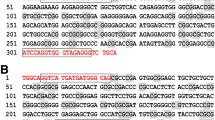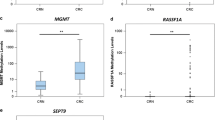Abstract
The aim of this study was to determine the frequency of p16 and hMLH1 genes simultaneous methylation in colorectal cancer patients with Microsatellite Instability (MSI) tumors. We also wanted to analyze the relationship with other clinical features, with BRAF gene V600E mutation and with prognosis. Samples from fifty one patients with MSI positive sporadic colorectal cancer were included. DNA was extracted from tumor samples. Promoter methylation was analyzed using bisulfite modification and was detected by quantitative methylation-specific PCR. BRAF gene was amplified using specific primers and mutations were detected by real time PCR. Simultaneous methylation was transformed in a new variable called CMETH2. Frequency of CMETH2 was analyzed and compared with other clinicopathological variables. 33.3 % of patients were positive for CMETH2 and 25 % had BRAF V600E mutation. CMETH2 was related with proximal location, with poorly differentiated tumors and with BRAF V600E mutation. CMETH2 only showed influence in the overall survival (OS) in patients with distal tumors. However, with regard to the disease free survival (DFS) measure, CMETH2 was independent prognostic factor. We were able to discriminate tumors with high methylation features using a transformation analysis of variables into a new computed one (CMETH2). CMETH2 has demonstrated to be a useful prognostic factor in MSI tumors. The prognostic value of CMETH2 in DFS was independent of other clinicopathological variables. The use of CMETH2 could help in the election of the best therapeutic alternative for CCR patients with MSI tumors.

Similar content being viewed by others
References
Sweeney C, Boucher KM, Samowitz WS, et al. Oncogenic Tree model of somatic mutations and DNA methylation in colon tumors. Genes, Chromosomes Cancer. 2009;48:1–9.
Tóth E, Serester O, Gallai M, et al. Molecular pathways and pathomorphology of colorectal cancers. Rom J Morphol Embryol. 2011;52:767–73.
Miladi-Abdennadher I, Abdelmaksoud-Damak R, Ayadi L, et al. Aberrant methylation of HMLH1 and p16INK4a in Tunisian patients with sporadic colorectal adenocarcinoma. Biosci Rep. 2011;31(4):257–64.
Weisenberger DJ, Siegmund KD, Campan M, et al. CpG island methylator phenotype underlies sporadic microsatellite instability and is tightly associated with BRAF mutation in colorectal cancer. Nat Genet. 2006;38:787–93.
Ogino S, Nosho K, Kirkner GJ, et al. CpG island methylator phenotype, microsatellite instability, BRAF mutation and clinical outcome in colon cancer. Gut. 2009;58(1):90–6.
Toyota M, Ohe-Toyota M, Ahuja N, et al. Distinct genetic profiles in colorectal tumors with or without the CpG island methylator phenotype. Poc Natl Acad Sci USA. 2000;97:710–5.
Dahlin AM, Palmqvist R, Henriksson ML, et al. The role of the CpG island methylator phenotype in colorectal cancer prognosis depends on microsatellite instability screening status. Clin Cancer Res. 2010;16:1845–55.
Ogino S, Meyerhardt JA, Kawasaki T. CpG island methylation, response to combination chemotherapy, and patient survival in advanced microsatellite stable colorectal carcinoma. Virchows Arch. 2007;450:529–37.
Kim JH, Shin SH, Kwon HJ, et al. Prognostic implications of CpG island hypermethylator phenotype in colorectal cancers. Virchows Arch. 2009;455:485–94.
Li X, Hu F, Wang Y, Yao X, et al. CpG island methylator phenotype and prognosis of colorectal cancer in Northeast China. Biomed Res Int. 2014;2014:236361.
Brim H, Abu-Asab MS, Nouraie M, et al. An integrative CGH, MSI and candidate genes methylation analysis of colorectal tumors. PLoS One. 2014;9(1):e82185.
Han SW, Lee HJ, Bae JM, et al. Methylation and microsatellite status and recurrence following adjuvant FOLFOX in colorectal cancer. Int J Cancer. 2013;132(9):2209–16.
Bae JM, Kim JH, Cho NY, et al. Prognostic implication of the CpG island methylator phenotype in colorectal cancers depends on tumour location. Br J Cancer. 2013;109(4):1004–12.
Kim JH, Rhee YY, Bae JM, et al. Subsets of microsatellite-unstable colorectal cancers exhibit discordance between the CpG island methylator phenotype and MLH1 methylation status. Mod Pathol. 2013;26(7):1013–22.
Yamauchi M, Morikawa T, Kuchiba A, et al. Assessment of colorectal cancer molecular features along bowel subsites challenges the conception of distinct dichotomy of proximal versus distal colorectum. Gut. 2012;61(6):847–54.
Liggett WH, Sidransky D. Role of the p16 tumor suppressor gene in cancer. J Clin Oncol. 1998;16:1197–206.
Burri N, Shaw P, Bouzourene H, et al. Methylation silencing and mutations of the p14ARF and p16INK4a genes in colon cancer. Lab Invest. 2001;81:217–29.
Tommasi S, Pinto R, Petriella D, et al. Oncosuppressor methylation: a possible key role in colon metastatic progression. J Cell Physiol. 2011;226:1934–39.
Sanz-Casla MT, Maestro ML, Vidaurreta M, et al. p16 gene methylation in colorectal tumors: correlation with clinicopathological features and prognostic value. Dig Dis. 2005;23:151–5.
Kanai Y, Ushijima S, Kondo Y, et al. DNA methyltransferase expression and DNA methylation of CpG islands and peri-centromeric satellite regions in human colorectal and stomach cancer. In J Cancer. 2001;91:205–12.
Ogino S, Odze RD, Kawasaki T, et al. Correlation of pathologic features with CpG island methylator phenotype (CIMP) by quantitative DNA methylation analysis in colorectal carcinoma. Am J Surg Pathol. 2006;30:1175–83.
Iacopetta B, Grieu F, Li W, et al. APC gene methylation is inversely correlated with features of the CpG island methylator phenotype in colorectal cancer. Int J Cancer. 2006;119:2272–8.
Psofaki V, Kalogera C, Tzambouras N, et al. Promoter methylation status of HMLH1, MGMT, and CDKN2A/p16 in colorectal adenomas. World J Gastroenterol. 2010;16:3553–60.
Mitomi H, Fukui N, Tanaka N, et al. Aberrant p16(INK4a) methylation is a frequent event in colorectal cancers: prognostic value and relation to mRNA expression and immunoreactivity. J Cancer Res Clin Oncol. 2010;136:323–31.
Shen L, Catalano PJ, Benson III AB, et al. Association between DNA methylation and shortened survival in patients with advanced colorectal cancer treated with 5-Xuorouracil-based chemotherapy. Clin Cancer Res. 2007;13:6093–8.
Ogino S, Cantor M, Kawasaki T, et al. CpG island methylator phenotype (CIMP) of colorectal cancer is best characterised by quantitative ADN methylation analysis and prospective cohort studies. Gut. 2006;55:1000–6.
Tanaka N, Huttenhower C, Nosho K, et al. Novel application of structural equation modeling to correlation structure analysis of CpG island methylation in colorectal cancer. Am J Pathol. 2010;177:2731–40.
Shima K, Nosho K, Baba Y, et al. Prognostic significance of CDKN2A (p16) promoter methylation and loss of expression in 902 colorectal cancers: cohort study and literature review. Int J Cancer. 2011;128:1080–94.
Ahn JB, Chung WB, Maeda O, et al. DNA methylation predicts recurrence from resected stage III proximal colon cancer. Cancer. 2011;117:1847–54.
Veigl ML, Kasturi L, Olechnowicz J, et al. Biallelic inactivation of HMLH1 by epigenetic gene silencien, a novel mechanism causing human MSI cancers. Proc Natl Acad Sci U S A. 1998;95:8698–702.
Herman JG, Umar A, Polyak K, et al. Incidence and functional consequences of HMLH1 promoter hypermethylation in colorectal carcinoma. Proc Natl Acad Sci U S A. 1998;95:6870–75.
Li X, Yao X, Wang Y, et al. MLH1 promoter methylation frequency in colorectal cancer patients and related clinicopathological and molecular features. PLoS One. 2013;8(3):e59064.
Kumar K, Brim H, Giardiello F, et al. Distinct BRAF (V600E) and KRAS mutations in high microsatellite instability sporadic colorectal cancer in African Americans. Clin Cancer Res. 2009;15(4):1155–61.
Koinuma K, Shitoh K, Miyakura Y, et al. Mutations of BRAF are associated with extensive HMLH1 promoter methylation in sporadic colorectal carcinomas. Int J Cancer. 2004;108:237–42.
Rajagopalan H, Bardelli A, Lengauer C, et al. Tumorigenesis: RAF/RAS oncogenes and mismatch-repair status. Nature. 2002;418:934.
Vidaurreta M, Sanz-Casla MT, Maestro ML, et al. Microsatellite instability predicts better outcome in colorectal cancer patients. Med Clin (Barc). 2005;124(4):121–5.
Maestro ML, Vidaurreta M, Sanz-Casla MT, et al. Role of the BRAF mutations in the microsatellite instability genetic pathway in sporadic colorectal cancer. Ann Surg Oncol. 2007;14(3):1229–36.
Suehiro Y, Wong CW, Chirieac LR, et al. Epigenetic-genetic interactions in the APC/WNT, RAS/RAF, and P53 pathways in colorectal carcinoma. Clin Cancer Res. 2008;14(9):2560–9.
Bihl MP, Foerster A, Lugli A, et al. Characterization of CDKN2A(p16) methylation and impact in colorectal cancer: systematic analysis using pyrosequencing. J Transl Med. 2012;10:173.
Kim JH, Kang GH. Molecular and prognostic heterogeneity of microsatellite-unstable colorectal cancer. World J Gastroenterol. 2014;20:4230–43.
Boland CR, Thibodeau SN, Hamilton SR, et al. A National Cancer Institute Workshop on microsatellite instability for cancer detection and familial predisposition: development of international criteria for the determination of microsatellite instability in colorectal cancer. Cancer Res. 1998;58:5248–57.
Veganzones S, Rafael S, Vidaurreta M, et al. p16 gene methylation in colorectal cancer patients with long-term follow-up. Rev Esp Enferm Dig. 2012;104:111–7.
Muzny DM, Bainbridge MN, Chang K, et al. The cancer genome atlas network. Comprehensive molecular characterization of human colon and rectal cancer. Nature. 2012;487:330–7.
Yamashita K, Dai T, Dai Y, et al. Genetics supersedes epigenetics in colon cancer phenotype. Cancer Cell. 2003;4:121–31.
Perucho M. Cancer of the microsatellite mutator phenotype. Biol Chem. 1996;377:675–84.
Issa JP. Colon cancer: it’s CIN or CIMP. Clin Cancer Res. 2008;14:5939–40.
Ahuja N, Mohan AL, Li Q, et al. Association between CpG island methylation and microsatellite instability in colorectal cancer. Cancer Res. 1997;57:3370–4.
Norrie MW, Hawkins NJ, Todd AV, et al. Inactivation of p16INK4a by CpG hypermethylation is not a frequent event in colorectal cancer. J Surg Oncol. 2003;84:143–50.
Barault L, Charon-Barra C, Jooste V, et al. Hypermethylator phenotype in sporadic colon cancer: study on a population-based series of 582 cases. Cancer Res. 2008;68:8541–6.
Samadder NJ, Vierkant RA, Tillmans LS, et al. Associations between colorectal cancer molecular markers and pathways with clinicopathologic features in older women. Gastroenterology. 2013;145:348–56.
Ward RL, Cheong K, Ku SL, et al. Adverse prognostic effect of methylation in colorectal cancer is reversed by microsatellite instability. J Clin Oncol. 2003;21:3729–36.
Samowitz WS, Sweeney C, Herrick J, et al. Cancer Res. Poor survival associated with the BRAF V600E mutation in microsatellite-stable colon cancers. Cancer Res. 2005;65:6063–9.
Lee S, Cho NY, Yoo EJ, et al. CpG island methylator phenotype in colorectal cancers: comparison of the new and classic CpG island methylator phenotype marker panels. Arch Pathol Lab Med. 2008;132:1657–65.
Donada M, Bonin S, Barbazza R, et al. Management of stage II colon cancer—the use of molecular biomarkers for adjuvant therapy decision. BMC Gastroenterology. 2013;13:36.
Ogino S, Shima K, Meyerhardt JA, McCleary NJ, Ng K, Hollis D, et al. Predictive and prognostic roles of BRAF mutation in stage III colon cancer: results from intergroup trial CALGB 89803. Clin Cancer Res. 2012;18:890–900.
Sargent DJ, Marsoni S, Monges G, Thibodeau SN, Labianca R, Hamilton SR, et al. Defective mismatch repair as a predictive marker for lack of efficacy of fluorouracil-based adjuvant therapy in colon cancer. J Clin Oncol. 2010;28:3219–26.
Van Rijnsoever M, Elsaleh H, Joseph D, et al. CpG island methylator phenotype is an independent predictor of survival benefit from 5-fluorouracil in stage III colorectal cancer. Clin Cancer Res. 2003;9:2898–903.
Jover R, Nguyen TP, Pérez-Carbonell L, et al. 5-Fluorouracil adjuvant chemotherapy does not increase survival in patients with CpG island methylator phenotype colorectal cancer. Gastroenterology. 2011;140:1174–81.
An B, Kondo Y, Okamoto Y, et al. Characteristic methylation profile in CpG island methylator phenotype-negative distal colorectal cancers. Int J Cancer. 2010;127:2095–105.
Arends MJ. Pathways of colorectal carcinogenesis. Appl Immunohistochem Mol Morphol. 2013;21(2):97–102.
Conflicts of interest
None.
Author information
Authors and Affiliations
Corresponding author
Rights and permissions
About this article
Cite this article
Veganzones, S., Maestro, M.L., Rafael, S. et al. Combined methylation of p16 and hMLH1 (CMETH2) discriminates a subpopulation with better prognosis in colorectal cancer patients with microsatellite instability tumors. Tumor Biol. 36, 3853–3861 (2015). https://doi.org/10.1007/s13277-014-3027-1
Received:
Accepted:
Published:
Issue Date:
DOI: https://doi.org/10.1007/s13277-014-3027-1




